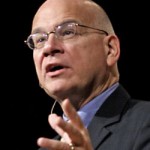
“What does God want me to do with my life?” is probably one of the questions pastors most frequently hear. A number of parachurch ministries exist to walk alongside people as they seek to answer this question. We spoke with Jeff Dunbar, director at Sons of Encouragement, a ministry that helps men discover their gifts, calling and passions. Our conversation was a reminder that our whole lives–every activity–whether we’re at work, spending time with family, doing laundry, playing soccer with friends, or reading a book–can be lived as “calling” if it flows out of the truth of who we are in Christ. Part of the work of vocational discipleship then, is to guide people into freedom from the lies that hinder them from receiving and living in the ultimate source of truth–God’s love. We discussed these challenges, as well as some of the battles men in particular face.
Theology of Work Project (TOW): What is vocational discipleship? How does it fit into “regular” discipleship?
JD: For me, vocational discipleship is very much a part of discipleship. How a man relates to the world (his worldview) will dictate how he perceives his vocation. I do not make a distinction [between discipleship and vocational discipleship] because I believe God wants men to truly live out of who they are, everywhere they are.
You’ve got to get to know the whole of the man, I think, before you can functionally and redemptively engage to help him wrestle with vocation.
TOW: What are the challenges this type of holistic discipleship?
JD: We as Christians have been much more consumed with the doing of Christianity rather than the being of Christianity. If you ask the question “Who am I?”, most men who have been discipled, or have been to a Bible study, can tell you theologically who they are in Christ. But their theology and their reality in many cases—in most cases that I’ve come across—are vastly different. So the idea of who we are in Christ and the reality of how that gets lived out inside of us is an amazing journey that I have the privilege of sharing with a good number of men.
I truly believe missional living comes out of missional being. When I know who I am in Christ, and how God has gifted and created me uniquely–God granting me to believe that—I take the monster of comparison off the table. Because if I’m unique there is no other me.
TOW: Is comparison a pervasive issue?
JD: Comparison is a monster that most men that I have engaged with are challenged by every day. We could become very well eclectics…because we see something in somebody else that God has gifted them in, and we want to be like that. But we…may or may not be gifted or wired that way.
A lot of men are defined by what they do and how well they do it. They find their value in those things. And success, money and the metrics of the world pervade even Christian men.
TOW: As Christians, what should our metrics be?
JD: This is purely my opinion. I believe that the metric God has for us is obedience to His will. We have a living relationship with God himself, and we can be in communion with God. My only hope is that if I walk in union with him—having confessed the sins of which he has convicted me, and having come back into reconciliation and right standing with him, which is the imputation of his righteousness—then hearing his will and obeying him is really what my call is.
1 Corinthians 13 talks about that. I could give all my money to the poor and my body to be burned, but without love, it’s not in the will of God and not in the purpose of God. Then it profits me nothing. Obedience to the will of God is the metric because it’s not the magnitude of what I can do. Whether I am changing my granddaughter’s dirty diaper or preaching to 5000 people about the kingdom of God, whatever the will of God is for me in the moment is all that he expects me to do, with his love and with his heart.
For me personally, it’s leveled out [my perspective on life] so that it’s not this big, manic [feeling of being] up on the mountaintops serving God and then coming down into the valley of the mundane. It’s a continuum; it’s not like I’m being obedient to the will of God now that I’m talking about the Lord with you. It’s all the continuum of the whole day.
TOW: What questions do people usually come to you with? And how do you approach these questions?
JD: “I’m dissatisfied with what I’m doing. I’m not finding fulfillment in my work.” The answer to that question is not necessarily “go get another job.” And this is where helping them understand how God has created them comes in. We use a behavioral assessment tool called RightPath. It provides a wonderful beginning to help a man discover how God has gifted him and the passions he’s been given. What has he skilled you to do? What are the things that are important to you within the context of work? Then we look at his life experience and how some experiences may have significantly hindered him from really believing that God has said is true about him. We begin there and start to listen to a man’s heart.
If someone has believed lies, encouraging him into confession, repentance and forgiveness, and asking God for the faith to live out of who he is—as he discovers who he is—has been amazing to see. It is truly helping people to just simply be themselves again.
It becomes what Paul says to the Corinthians: we’re the living letters to declare that Christ is who he says he is. The tools [of this ministry] are the word of God, the spirit of God, and sitting in friendship to help men wrestle with the issues of their lives, their sins, deceptions. It’s a journey that takes time.
Their circumstance may never change, but if they are transformed, [their current situation] could be the most exciting place in the world for them to work. Or God could lead to them to another area of employment.
TOW: Is there anything you wish every church goer could know?
JD: Their work is not a means to an end.—I think most people have had some exposure to the ideas that “I work because I have to support my family, because I need to, because God told me to. God created me to work.” But what they don’t see is the beauty of the fact that God has created them in his image. They’re each unique, and they can find a place. I believe if we’re insecure about God has gifted and created us, then we become what I call “Goldilocks Christians.” We’re trying one ministry, one job, one relationship, and we go from one to another, looking for the proverbial better chair that’s just the right size—instead of being led by the spirit of God–with intentionality–to grow out of who we are and to live that out in the places that God calls us to.
Click to Like Theology of Work Project on Facebook












